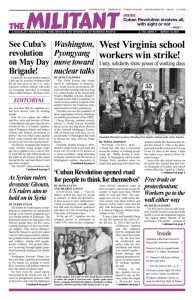The Wall Street Journal calls President Donald Trump’s proposed hefty tariffs on steel and aluminum imports “the biggest policy blunder of his presidency.” The tariffs — announced on the pretense of protecting “American” jobs — “will benefit a handful of companies,” the Journal asserts, but lead to layoffs at others.
MarketWatch, a Dow Jones website, took the opposite view. “Tariffs on steel, aluminum are long overdue,” Robert Scott writes, and are needed to protect U.S. bosses from “unfair trade.”
Capitalist trade policy — free trade or protection — always favors some section of the bosses at home and abroad at the expense of others. Far from benefiting, workers “go to the wall” either way, Karl Marx explained over 170 years ago.
The Huffington Post tried to have it both ways. The left-liberal news site complains that the new tariffs don’t go far enough in putting the hurt on bosses in China, but mistakenly harms “allies” in Canada and the European Union.
Chinese companies produce more than 800 million metric tons of steel a year, the Post complains, compared to just over 70 million made by U.S. bosses. U.S. companies charge that their Chinese competitors dump their “excess” production at super-cheap prices.
United Steelworkers union officials jump on the bandwagon, fearing their dues-paying membership might decline as a result. They back the bosses on this instead of mobilizing workers to unite, stand up to the bosses and offer solidarity across borders.
“Steelworkers and Ohio Lawmakers Welcome Trump’s Tariff on Dumped Steel” was the headline in the March 2 People’s World, the internet-only newspaper of the Communist Party USA. The article favorably quotes United Steelworkers President Leo Gerard, who uses pro-imperialist rhetoric to back the tariffs. “Hard-working Americans,” Gerard said, “expect national security, the foundation of which is built with steel and aluminum, to be protected.”
Politicians of both capitalist parties line up depending on which bosses live in their area. “You’d expect a policy this bad from a leftist administration, not a supposedly Republican one,” Nebraska Republican Sen. Ben Sasse said. Like other tariff opponents, he worries it could set off a “trade war” that would harm corporate farmers and big business in Nebraska.
Trump’s response? U.S. capitalists would win any trade war. History teaches workers that trade wars have a way of turning into shooting wars, and the working class would be the cannon fodder.
Stance of class-conscious workers
What stance should class-conscious workers take?
The bosses push their trade policies as what’s “good for America.” But there is no abstract America — there are two major classes here, as elsewhere, with diametrically opposed interests. On one side are the capitalists and on the other the working class that owns nothing but its labor power.
“We start with the interests of the working class, which is an international class,” Socialist Workers Party National Secretary Jack Barnes said in “Our Politics Start with the World,”published in New International no. 13. “We’re unconditionally opposed to the rulers of the United States imposing protectionist barriers of any kind under any pretext on imported goods.”
“We do everything possible to expose the ‘free trade’ demagogy of finance capital,” Barnes said. “It aims to advance the national interests of the exploiting class, including balancing the conflicting profit needs of capitalist sectors that are vulnerable to competition on the world market to quite different degrees.” That’s why you get bosses on both sides of the issue.
“Under the banner of free trade, the U.S. government uses so-called antidumping clauses, ‘environmental’ and ‘labor standards’ restrictions, ‘human rights’ demagogy, and other measures to carry out brutal and aggressive trade wars not only against its imperialist rivals,” Barnes says, “but with special ferocity against the semicolonial countries.”
The U.S. rulers and all the big capitalist powers have clawed their way to the top of the heap by plunder of the semicolonial world. The imperialist powers buy up the raw materials and products of light industry from semicolonial countries at low prices and sell back the finished products to them at higher prices. And high interest loans sink those countries deeper in debt.
The workings of the world capitalist market guarantee the looting of the semicolonial world, Barnes explains, not primarily due to “unfair” terms of trade, but as a result of “the differential value of labor power and the gap in productivity of labor between the imperialist countries on the one hand and those oppressed and exploited by imperialism on the other — a differential that not only underlies unequal exchange but relentlessly reproduces and increases it.”
That’s why class-conscious workers back efforts by oppressed nations to protect their economies.
The capitalist rulers use both free trade and protectionism to try to outsell their rivals. Most trade deals — like the North America Free Trade Agreement and the failed Trans-Pacific Partnership trade pact advocated by Barack Obama — combine both.
We can’t let the bosses pit us against each other. We need to offer solidarity to fellow workers around the world and refuse to be suckered into the nationalist anti-free trade campaigns.

